Splendor and Squalor: PART III
Growing up in Colorado, I was always surrounded by the images of exotic lands far away. Downstairs in our family room, my mother had labored for months over a series of immense collages illustrating the many countries she had had the opportunity to visit while going to or from the mission field. I used to stand in that room and soak in every image—the towering Swiss Alps, Big Ben on a rainy English afternoon, the Eiffel tower seen from the river Seine, windmills spinning lazily amid Dutch tulips… For me, these collages represented some of the most marvelous pieces of earth the world had to offer. They also represented places I never dreamed I would have the opportunity to see with my own eyes.
It has been three years since I moved to Europe and I have seen 20 countries and counting. I have seen the mighty Coliseum, the bullrings of Spain, the castles of Prague. I have intimately witnessed each and every one of the countries those posters of my childhood represented, and more.
And yet, in that room of my old house, there was a very special corner with multiple posters devoted wholly to the one location more exotic and untouchable than any other—Africa. True, I had made it to Europe, but surely Africa was beyond my reach. And yet, here I was.
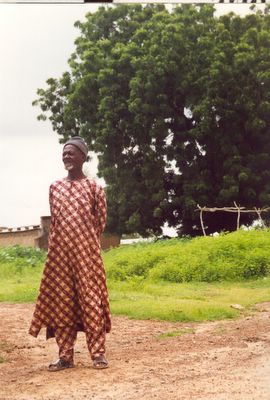
When I first realized that Africa was going to be a reality, my naïve western mind was aflutter with the possibilities of what I was going to see, taste, and hear. I pictured vast plains carpeted with undulating waves of wild beasts; lions roaming baobab-shaded forests, and crocodiles slinking into brown rivers while giant pythons watched from positions high in the trees.
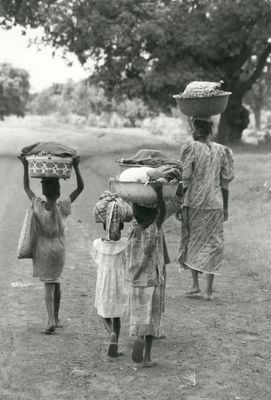
But the truth of the matter is that none of that is Africa. Not truly. I could have gone the entire vacation without seeing one wild animal and I would have still boarded the plane for home having seen a multitude more than any tourist ever could. I knew I had already seen the real Africa—I had seen it in the face of Esther, heard it in the voice of Benjamin, felt it in the arms of Tingandi—the real Africa was her people. I had tasted some incredible delicacies in Burkina—from the tart bite of weta, the smooth chalk of tama, the sugary syrupiness of mangos, the sweetness of roasted corn—but none was more satisfying or more delicious than her people.
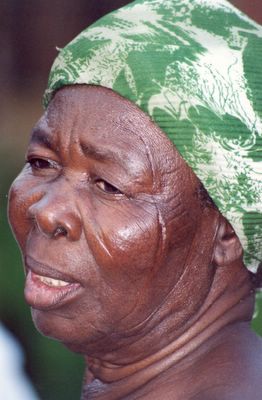
For me, Africa will always be the smiling faces of her children as seen through the lens of my camera.

And there are many such faces. According to Nancy Valnes, a missionary whose gospel is by necessity more contraceptives than Christianity, Burkina has the second highest death toll to AIDS in West Africa. In some of the more urban areas, orphaned children are out-populating their adult counterparts. But as the song goes, “they are all precious in His sight.” Mine too.
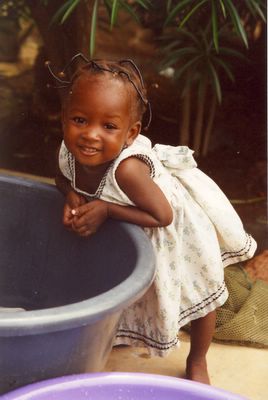
I will always be able to instantly recall chasing the more daring children around the village huts or how the smaller ones shrieked in terror at the strange white man who approached them.
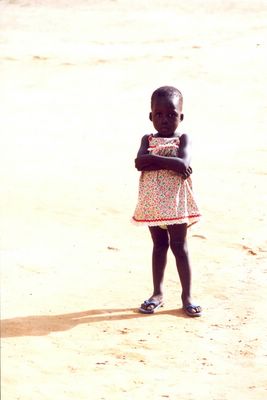
I will never forget the looks they made as I handed out Jolly Ranchers or Bazooka Joe bubble gum, or befuddled them with something they had never seen before—a balloon.


I will always remember driving down the road and waving to the children working in the fields and watching them drop their hoes to sprint, giggling after the truck. I easily took twice as many pictures of Africa’s little ones as I did the castles and cathedrals of France where I had been vacationing before this trip began.
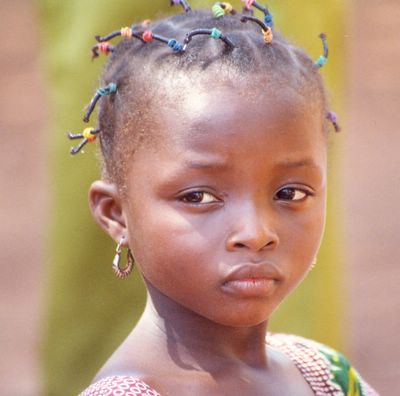
As I followed my grandparents and mother around to all the tiny villages, tucked away like so many forgotten gems in the bush, I discovered exactly why they had fallen in love with Africa and more importantly fallen in love with her lifeblood. And now, all those stories I had heard growing up have become personal and intimate memories of my own. I have seen first hand where the panther killed my mother’s pet rabbits and set down bloody paw prints as it moved throughout the inside of their house that hot summer night while they slept; I have seen where my mother used to rise before the sun and ride her horse at breakneck speeds before being called in for home school; I have seen where my grandfather brought down the mad hippo with one shot; where the scorpion scaled my uncle’s bicycle wheel, unfazed whatsoever by its crushing rotation. All these stories and more are now a part of my life too, a collective set of memories we all share. There was always a part of my family I could never truly understand, an inner sanctum to which I could not hope to gain access no matter how hard I tried. I could not comprehend my grandparent’s quest in life nor my mother’s overwhelming upbringing until I physically set foot on the sacred soil that is Africa and saw things through their eyes.

My mother has never really considered herself an American. She has always said that she is a Burnkinaba “waiting for her black paint.” While on this trip, someone honored her by calling her a “Daughter of Africa.” If true, and I know now that it is, than I guess that makes me a grandchild of Africa. I cannot think of a greater honor, nor a greater family into which I’ve been adopted.
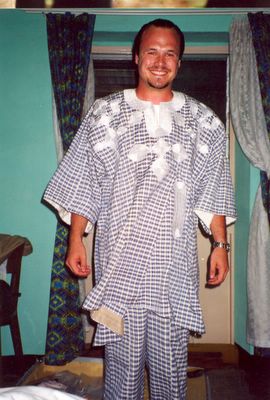
* * *
12:30pm
Nazinga Game Ranch
Burkina Faso, West Africa
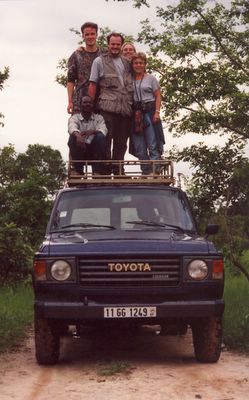
Our Land Cruiser is heavier by one.
Having returned to the camp for a late breakfast, we’re now leaving with a local African guide who perches himself deftly on the front of the luggage rack, legs nearly dangling over the windshield. While we grip the metal for dear life, he sits calmly with his hands folded in his lap, perfectly balanced.
“He says he knows where the elephants are,” Clark says, wrenching open his door. Sliding back into the passenger seat he says to no one in particular, “which may mean nothing at all.”
The morning was not a total loss. Though the rain continued unabated for hours, it was only the first hour or so in which it fell in sufficient measure to keep us cocooned inside our SUV. The remainder of the morning it slowed to a heavy drizzle and allowed us the opportunity to stick our heads from the half open windows and scan the bush. By the time we returned to camp for some much needed breakfast, the coffee long since having borne acidic craters in our stomachs, we had seen numerous species of antelope, hartebeest, and even warthog. But still, no sign of any elephant.
A few green oranges and some jam-lathered French bread later, we are at it again. There is a renewed hope among us that this time out may be the one, although none of us are sure if that isn’t just our contented bellies speaking. Very few minutes into the trek we realize our guide has eyes to match the hawks and vultures we see constantly circling overhead. Pointing out a crocodile sunning himself on a pond log, it takes the rest of us a full minute to see what he is referring to. Emboldened by his keen eyesight, we settle back into our ridged metal pallet.
But Africa is not cooperating. Worse still, she is mocking us. From atop our precarious platform we can see deep impressions made in the sodden dirt, impressions that look suspiciously like elephant tracks. A bit further up a heaping pile of dung lies beside the remains of a tree snapped at its base by something large moving through the bush. Elephants certainly passed though here…but when? We watch our guide’s face almost as much as the tree line, hoping to see some flash of recognition there. It does not come.
It has been several hours now and we are no closer to our objective then when we rose this morning. Adding insult to injury, the lighthearted joking about the state of our backsides has now converted into full-fledged complaining. Every hole in the road is a groan, every large rock a grimace. Pain comes not only from below but from above as well. Low hanging branches frequently catch the unvigilant off guard and leave him or her with a stinging welt and a mouthful of leaves. Like contortionists, we attempt to rearrange our bodies in unnatural angles—anything to relieve surface area contact.
I scratch absentmindedly at a plethora of swollen mounds on my legs. Malaria inception point number one…number two…number three… There is talk of returning to camp and taking some lunch and some much needed rest when our guide’s arm flies out, pointing to the left of us. He quietly but effectively mouths the word, “Elephant.” Where!? The SUV rumbles to a stop and six sets of eyes attempt to follow our guide’s outstretched arm into the bush. All we can see are trees, trees, and more trees. As catlike as possible, we slide from the edge of our roost and cup hands over our eyes and peer intently.
And then we see them. Something immensely large and gray is moving behind a veil of foliage. Its steps are deliberate and plodding, the motions of a titanic behemoth perfectly secure with its place in the world, afraid of nothing. Through a break in the trees, three elephants--two adults and a juvenile--become visible. They are magnificent, in a way that is almost otherworldly. They lumber from the trees, picking at branches with their mighty trunks while I creep as close as the guide will dare.
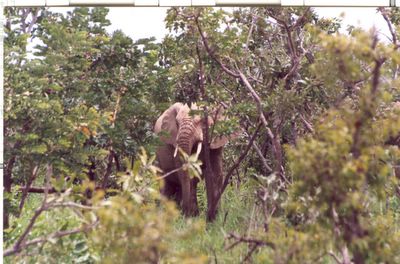
A horde of sweat bees, thick as a mesh, swarm around my face and arms, drawing drops of blood at dozens of bite marks. Ignoring them, I snap a roll of film. If anyone could have seen through the shroud of bugs around my face, they would have seen a smile that stretched from ear to ear.
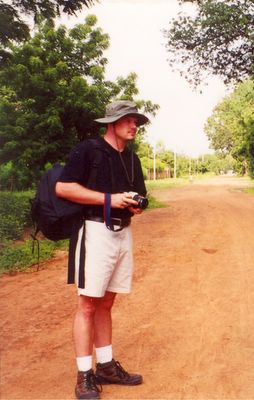
It has been three years since I moved to Europe and I have seen 20 countries and counting. I have seen the mighty Coliseum, the bullrings of Spain, the castles of Prague. I have intimately witnessed each and every one of the countries those posters of my childhood represented, and more.
And yet, in that room of my old house, there was a very special corner with multiple posters devoted wholly to the one location more exotic and untouchable than any other—Africa. True, I had made it to Europe, but surely Africa was beyond my reach. And yet, here I was.

When I first realized that Africa was going to be a reality, my naïve western mind was aflutter with the possibilities of what I was going to see, taste, and hear. I pictured vast plains carpeted with undulating waves of wild beasts; lions roaming baobab-shaded forests, and crocodiles slinking into brown rivers while giant pythons watched from positions high in the trees.

But the truth of the matter is that none of that is Africa. Not truly. I could have gone the entire vacation without seeing one wild animal and I would have still boarded the plane for home having seen a multitude more than any tourist ever could. I knew I had already seen the real Africa—I had seen it in the face of Esther, heard it in the voice of Benjamin, felt it in the arms of Tingandi—the real Africa was her people. I had tasted some incredible delicacies in Burkina—from the tart bite of weta, the smooth chalk of tama, the sugary syrupiness of mangos, the sweetness of roasted corn—but none was more satisfying or more delicious than her people.

For me, Africa will always be the smiling faces of her children as seen through the lens of my camera.

And there are many such faces. According to Nancy Valnes, a missionary whose gospel is by necessity more contraceptives than Christianity, Burkina has the second highest death toll to AIDS in West Africa. In some of the more urban areas, orphaned children are out-populating their adult counterparts. But as the song goes, “they are all precious in His sight.” Mine too.

I will always be able to instantly recall chasing the more daring children around the village huts or how the smaller ones shrieked in terror at the strange white man who approached them.

I will never forget the looks they made as I handed out Jolly Ranchers or Bazooka Joe bubble gum, or befuddled them with something they had never seen before—a balloon.


I will always remember driving down the road and waving to the children working in the fields and watching them drop their hoes to sprint, giggling after the truck. I easily took twice as many pictures of Africa’s little ones as I did the castles and cathedrals of France where I had been vacationing before this trip began.

As I followed my grandparents and mother around to all the tiny villages, tucked away like so many forgotten gems in the bush, I discovered exactly why they had fallen in love with Africa and more importantly fallen in love with her lifeblood. And now, all those stories I had heard growing up have become personal and intimate memories of my own. I have seen first hand where the panther killed my mother’s pet rabbits and set down bloody paw prints as it moved throughout the inside of their house that hot summer night while they slept; I have seen where my mother used to rise before the sun and ride her horse at breakneck speeds before being called in for home school; I have seen where my grandfather brought down the mad hippo with one shot; where the scorpion scaled my uncle’s bicycle wheel, unfazed whatsoever by its crushing rotation. All these stories and more are now a part of my life too, a collective set of memories we all share. There was always a part of my family I could never truly understand, an inner sanctum to which I could not hope to gain access no matter how hard I tried. I could not comprehend my grandparent’s quest in life nor my mother’s overwhelming upbringing until I physically set foot on the sacred soil that is Africa and saw things through their eyes.

My mother has never really considered herself an American. She has always said that she is a Burnkinaba “waiting for her black paint.” While on this trip, someone honored her by calling her a “Daughter of Africa.” If true, and I know now that it is, than I guess that makes me a grandchild of Africa. I cannot think of a greater honor, nor a greater family into which I’ve been adopted.

* * *
12:30pm
Nazinga Game Ranch
Burkina Faso, West Africa

Our Land Cruiser is heavier by one.
Having returned to the camp for a late breakfast, we’re now leaving with a local African guide who perches himself deftly on the front of the luggage rack, legs nearly dangling over the windshield. While we grip the metal for dear life, he sits calmly with his hands folded in his lap, perfectly balanced.
“He says he knows where the elephants are,” Clark says, wrenching open his door. Sliding back into the passenger seat he says to no one in particular, “which may mean nothing at all.”
The morning was not a total loss. Though the rain continued unabated for hours, it was only the first hour or so in which it fell in sufficient measure to keep us cocooned inside our SUV. The remainder of the morning it slowed to a heavy drizzle and allowed us the opportunity to stick our heads from the half open windows and scan the bush. By the time we returned to camp for some much needed breakfast, the coffee long since having borne acidic craters in our stomachs, we had seen numerous species of antelope, hartebeest, and even warthog. But still, no sign of any elephant.
A few green oranges and some jam-lathered French bread later, we are at it again. There is a renewed hope among us that this time out may be the one, although none of us are sure if that isn’t just our contented bellies speaking. Very few minutes into the trek we realize our guide has eyes to match the hawks and vultures we see constantly circling overhead. Pointing out a crocodile sunning himself on a pond log, it takes the rest of us a full minute to see what he is referring to. Emboldened by his keen eyesight, we settle back into our ridged metal pallet.
But Africa is not cooperating. Worse still, she is mocking us. From atop our precarious platform we can see deep impressions made in the sodden dirt, impressions that look suspiciously like elephant tracks. A bit further up a heaping pile of dung lies beside the remains of a tree snapped at its base by something large moving through the bush. Elephants certainly passed though here…but when? We watch our guide’s face almost as much as the tree line, hoping to see some flash of recognition there. It does not come.
It has been several hours now and we are no closer to our objective then when we rose this morning. Adding insult to injury, the lighthearted joking about the state of our backsides has now converted into full-fledged complaining. Every hole in the road is a groan, every large rock a grimace. Pain comes not only from below but from above as well. Low hanging branches frequently catch the unvigilant off guard and leave him or her with a stinging welt and a mouthful of leaves. Like contortionists, we attempt to rearrange our bodies in unnatural angles—anything to relieve surface area contact.
I scratch absentmindedly at a plethora of swollen mounds on my legs. Malaria inception point number one…number two…number three… There is talk of returning to camp and taking some lunch and some much needed rest when our guide’s arm flies out, pointing to the left of us. He quietly but effectively mouths the word, “Elephant.” Where!? The SUV rumbles to a stop and six sets of eyes attempt to follow our guide’s outstretched arm into the bush. All we can see are trees, trees, and more trees. As catlike as possible, we slide from the edge of our roost and cup hands over our eyes and peer intently.
And then we see them. Something immensely large and gray is moving behind a veil of foliage. Its steps are deliberate and plodding, the motions of a titanic behemoth perfectly secure with its place in the world, afraid of nothing. Through a break in the trees, three elephants--two adults and a juvenile--become visible. They are magnificent, in a way that is almost otherworldly. They lumber from the trees, picking at branches with their mighty trunks while I creep as close as the guide will dare.

A horde of sweat bees, thick as a mesh, swarm around my face and arms, drawing drops of blood at dozens of bite marks. Ignoring them, I snap a roll of film. If anyone could have seen through the shroud of bugs around my face, they would have seen a smile that stretched from ear to ear.



1 Comments:
Brandon, Thanks so much for posting the Africa event on your BLOG. Even though I have read it before, I always love to read again your writings. I long for the day when I get to purchase your novel about some great drama in life. You have an amazing talent!
Del
Post a Comment
<< Home